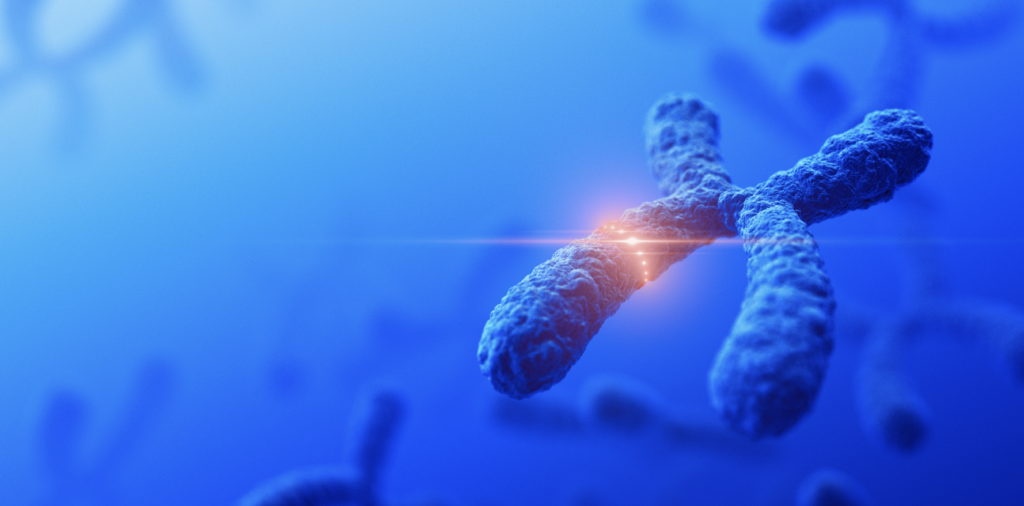Genetics plays a big role in our ability to have children. Sometimes, problems in our DNA can make it harder for a person to conceive naturally. Fortunately, science has come a long way, and doctors can now use genetic testing to help people understand and treat infertility. In this guide, we’ll break down how genetics affects fertility and what treatments are available in simple, easy-to-understand language.
Understanding the connection between genetics and infertility

1. How Genetics Affects Fertility
1.1 Genetic Causes of Infertility in Women
Some women may struggle to get pregnant due to changes in their DNA. Here are some common reasons:
- Chromosome Issues: Sometimes, a woman’s cells might have an extra chromosome or be missing one. This can lead to problems with ovulation (the release of eggs) and pregnancy.
- Early Menopause (Premature Ovarian Insufficiency – POI): Some women stop producing eggs at a younger age than usual. In some cases, this runs in families.
- Endometriosis and PCOS: These common conditions that affect fertility may have a genetic link. If your mother or sister has them, you might have a higher chance of developing them too.
- Egg Quality: As women age, their eggs naturally lose quality, but some women experience this sooner than others due to genetic reasons.
1.2 Genetic Causes of Infertility in Men
Men can also face fertility issues due to genetics. Some common causes include:
- Missing DNA on the Y Chromosome: This can reduce or stop sperm production.
- Klinefelter Syndrome: A condition where a man has an extra X chromosome, which affects testosterone levels and sperm production.
- Cystic Fibrosis-Related Infertility: Some men who carry a gene for cystic fibrosis are born without sperm ducts, making it impossible for sperm to leave the body naturally.
- Sperm DNA Damage: If the DNA inside sperm is broken or faulty, it can make pregnancy difficult or increase the risk of miscarriage.
2. How Genetic Testing Can Help With Infertility
If doctors suspect that a genetic issue is making it harder for someone to conceive, they may suggest genetic tests. These tests can help couples understand their chances of getting pregnant and what treatments might work best.
2.1 Preimplantation Genetic Testing (PGT)
- What It Is: This test is done during in vitro fertilization (IVF). After eggs and sperm are combined in a lab to create embryos, doctors check the embryos for genetic problems before implanting them in the uterus.
- Why It Helps: It can improve the chances of a healthy pregnancy by selecting embryos with the right number of chromosomes.
2.2 Carrier Screening
- What It Is: This test checks if a person carries genes for inherited diseases like cystic fibrosis or sickle cell anemia.
- Who Should Get It: It’s recommended for couples who have a family history of genetic diseases or come from ethnic backgrounds with a higher risk for certain conditions.
2.3 Chromosome Testing (Karyotype Analysis)
- What It Does: This test looks at the structure of a person’s chromosomes to see if there are any missing or extra pieces.
- Why It’s Important: If someone has a chromosomal issue, it may explain repeated miscarriages or trouble getting pregnant.
2.4 Sperm DNA Testing
- Why It’s Done: Sometimes, even if a man has normal sperm count, the DNA inside the sperm may be damaged.
- Who Should Consider It: Men who have had failed IVF attempts or whose partners have experienced multiple miscarriages.
3. Treatments for Genetic Infertility
Once doctors understand the genetic cause of infertility, they can recommend different treatments to help couples conceive.
3.1 IVF with Genetic Testing
- How It Works: Doctors create embryos in a lab and test them for genetic problems before placing them in the uterus.
- Best For: Couples who have a high risk of passing on a genetic disease or have had multiple failed pregnancies.
3.2 Egg or Sperm Donation
- When It’s Used: If genetic testing shows a severe issue, a couple may use a donated egg or sperm from a healthy person.
- What to Consider: Some countries have rules about whether donors can remain anonymous or must be known to the child.
3.3 Future Possibilities: Gene Editing
- What It Is: Scientists are working on ways to fix genetic problems before conception using new technology like CRISPR.
- Is It Available? Not yet for human reproduction, but research is ongoing.
4. Things to Consider: Ethical and Financial Challenges
- Moral Questions: Some people worry that selecting embryos or modifying genes could lead to “designer babies.”
- Limitations: Genetic testing isn’t perfect, and some problems may still go undetected.
- Cost and Access: Many genetic tests and treatments, like IVF, can be expensive and may not be covered by insurance.
5. Conclusion: What Should You Do Next?
If you or your partner are struggling with infertility and suspect genetics might be involved, consider speaking with a fertility specialist or genetic counselor. They can help you understand your options and find the best path to parenthood.
Now that you understood the connection between genetics and infertility, help us spread Vittafemme.com!
Join our mission to empower women with clear, science-based information about reproductive health.
Share this post, follow us on social media, and invite your friends to explore our platform.
Together, we can make fertility knowledge accessible to everyone who needs it.
References
· Cardim, H. J. (2009). Vencendo a Dificuldade de Engravidar. Editora Pensamento-Cultrix.
· Robaire, B., & Chan, P. (Eds.) (2023). Handbook of Andrology. American Society of Andrology.
· Van de Wiel, L. (2020). Freezing Fertility: Oocyte Cryopreservation and the Gender Politics of Aging. New York University Press.
· National Institute for Health and Care Excellence (NICE) (2024). Endometriosis: Diagnosis and Management. NICE Guidelines, NG73.
· Eekelen, R. et al. (2017). “Natural conception: repeated predictions over time”. Human Reproduction, 32(2), 346–353

Leave a Reply